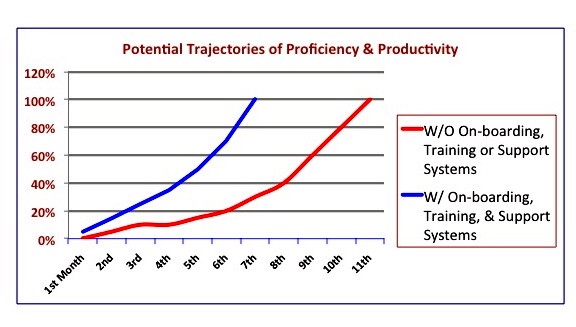TRAINING AND ON-BOARDING – NOT OPTIONAL
- November 5th, 2021
- Posted in Management Practices
- Write comment
TRAINING AND ON-BOARDING
SHOULD NEVER BE OPTIONAL
Whether you’ve hired the square peg to fit the square hole or opted for hiring someone for whom the job will be lateral move requiring time to acclimate to a new environment or the next step in a career, training, * support systems, and on-boarding are crucial components to the new employee’s first few months on the job. This applies regardless of level within the organization.
The effectiveness of these three processes will determine the trajectory of that new hire’s career with your company, the value they will deliver, and how soon they will begin delivering it.
* Support systems might include: Mentors, Go To People, well written job SOPs, supportive team environment.
As stated in the previous post on On-boarding (Post on “On-boarding” ) failure to achieve goals and objectives is a major factor causing failure in the job within 18 -24 months; Poorly planned and delivered On-boarding and Job Training is a major contributing factor in these failures.
QUESTION: The productivity of how many others is impacted by a new hire’s lack of proficiency due to poor training and onboarding? How long does this situation typically last? Most important, what is the COST?
Failure to provide effective training results in a “cost”
…….. an often unnoticed yet pervasive expense that seems to fly under the radar in many companies. Nevertheless, it is an unnecessary “cost” just like excessive errors & low productivity, spoiled inventory, over staffing, or excessive machine down time. Interestingly, these kinds of costs are all of great concern, but how often is the connection made to poor training follow by an initiative to effectively address the problem.
So what constitutes effective job training?
Effective job training is built upon correct content delivered in an orderly sequence to create full proficiency in the shortest possible time and includes support systems that reinforce training and provide assistance when necessary.
AND…a shared responsibility between the employee and the manager for achieving the objectives of the training.
Appropriate and focused content
 Delivered in an orderly sequence
Delivered in an orderly sequence
 With defined “milestones” within a time line
With defined “milestones” within a time line
 Resulting in full proficiency in the shortest possible time.
Resulting in full proficiency in the shortest possible time.
Making sure training is being done well
Job Training is typically left to departmental managers and supervisors. While HR cannot do departmental training, a true HR professionals should have the skill set to evaluate the effectiveness of a training process.
HR should have an understanding of the work of departments, as well as having some understanding of the jobs within them to be able to ask the right questions to evaluate the effectiveness of training programs. HR needs to provide guidance on training and HR does need to ask questions about how training is being done, the content, sequence, how it is being monitored and the timing to reach proficiency.
Detail on the training an employee has received should be part of each employee’s file. This is as important as maintaining records of employees’ performance reviews.
New Employee Feedback, mentioned in a previous post, is another critical piece in determining how effective employee training is – and don’t hesitate to ask for suggestions to improve it. Suggestions for a process to obtain new employee feedback will appear in a future post.
Lets look at the facts – the impact – of poor job training 
- Lowered productivity in the job
- Lowered productivity in related jobs
- Errors and waste
- Employees who are disengaged from their work
- Turnover, the worst kind, loss of the type of employees companies really don’t want to lose. The kind of employee who does not like feeling incompetent.
- Failure to identify, soon enough, those who cannot do the job
Training is so basic to productivity……..
It progressively increases the value a new employee delivers over a shorter time frame. Well-planned and executed training reduces the time to reach proficient thereby reducing the time it takes to execute tasks. Training is critical to creating an engaged employee. Feeling incompetent and unsure of oneself will never create engagement. Competence, proficiency, and productivity and the resulting “quality” of output are basic to delivering customer value. It is astounding that training is so often done so poorly, with little planning, order, and monitoring of effectiveness.
Examples of what employees have told me about their experience as a new hire
In talking to new employees after 4 – 9 months on the job these are examples of what I heard at several companies during new employee feedback meetings.
- I’m leaving because after 9 months, I’m still stumbling around and not comfortable that I will ever get the training I need to do this job well. Training is just not important here and that’s a threat to my success.
- There really wasn’t any formal training, no plan. I didn’t know what I would be tackling from one day to another or how things fit together.
- It was difficult to gain an understanding of what I needed to learn to do the job effectively and where I should be at any given time relative to learning the job, no road map so to speak.
- I know that I am a capable person, but the quality of the training I’ve had for this job has me feel anything but competent.
- I seemed to be getting training out of sequence with the order in which many processes should done because of where we were in the process, so I was really confused. I made a suggestion to remedy this but I don’t know if it will be used.
- After training was completed, there were no resources to use as a reference when I got stuck doing a complex process that I didn’t do regularly. My own notes were only somewhat helpful.
- People seemed to be doing the same tasks differently, so asking someone for help made things more confusing and I’m seeing that this creates another set of problems.
Details on the components and process of developing
excellent training programs – next post
Develop Training That Clearly Communicates – Productivity & Excellence Are Our Goals.


 Follow
Follow
No comments yet.